
Launching a career is a major milestone for young graduates, and choosing the right employer can shape their future in profound ways.
To understand how Belgian students feel about entering the job market, we surveyed 219 number of students in the Belgian higher education system.
Our survey explored critical topics, including students' confidence in their professional skills, their perceptions of top employers, the role of employer branding, and their job search preferences.
The results offer valuable insights into how prepared students feel for their careers, the skills they believe are most important, and their expectations from potential employers.
Confidence in professional skills
One of the central themes we explored was how confident students feel about their professional skill sets.
The results showed a diverse range of self-assessments:
- 35.16% of students feel equipped with the necessary skills for the workforce, with 10.50% feeling strongly confident.
- 33,79% of students expresses a neutral position.
- Conversely, 20.55% of students do not believe they have all the necessary skills to thrive in their careers, suggesting a significant skills gap among students.
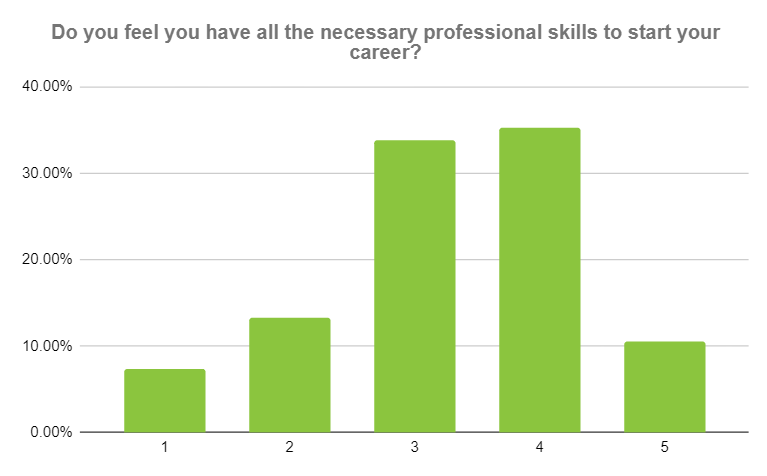
Hard skills vs. soft skills: where do students feel stronger?
In our survey, we explored students' self-assessment of both hard skills (technical abilities) and soft skills (communication, teamwork),
revealing key insights into where they feel more confident and where there may be room for growth.
- Hard Skills:
- Writing Professional Emails: A strong majority (67.58%) of students feel confident in their ability to write professional emails.
- Data Analysis in Excel: Confidence is much lower here, with only 36.53% rating their Excel skills as "Good" or "Very Good." This gap suggests that more training in technical data analysis could help students be better prepared for the demands of a data-driven job market
- Making PowerPoint Presentations: Students feel more confident in their ability to design presentations, with 72.60% rating their skills as "Good" or better. This suggests that presentation design is a well-developed skill among students, though presenting those slides (discussed under soft skills) requires further attention.
- Soft Skills:
- Teamwork: Collaboration is clearly a strength for students, with 68.50% rating themselves highly in their ability to work well in teams.
- Giving and Receiving Feedback: Another key soft skill, feedback, is also a strength, with 64.39% of students feeling comfortable both giving and receiving constructive criticism.
- Leadership: While 42.93% of students feel confident in their leadership abilities, this is lower than their confidence in other soft skills, suggesting a need for more development in leadership training. Leadership is often learned through experience, so it can be expected that this confidence might grow with time.
- Negotiation: Confidence in negotiation skills is similarly moderate, with 40.18% of students feeling capable.
- Professional Communication by Phone: More than half (56.17%) of students feel comfortable communicating by phone, though 15.53% admit they need improvement.
- Presenting: Confidence drops when it comes to presenting PowerPoints, with only 52.51% of students feeling assured in their presentation delivery.
Overall, students tend to feel more confident in soft skills like teamwork and giving/receiving feedback,
but there is a noticeable gap in their self-assessed hard skills, especially in data analysis using tools like Excel.
Bridging this gap will be key as the professional landscape continues to prioritize data-driven decision-making.
Additionally, skills like leadership, negotiation, and presentation delivery also present opportunities for further development as students prepare to enter the workforce.
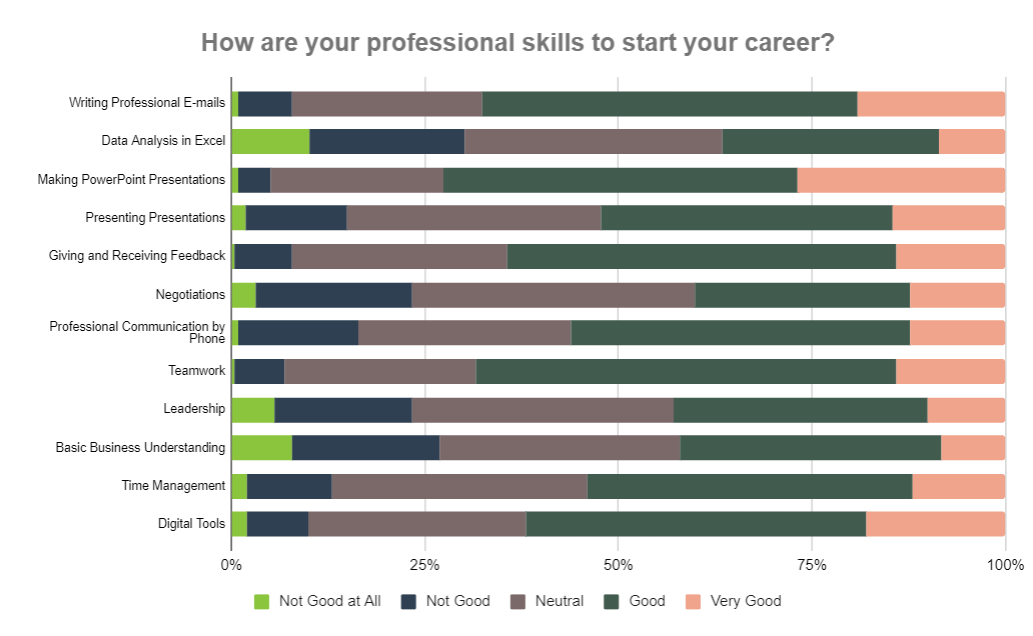
Job search expectations and activity
Duration of job search
The majority of students (30.14%) expect their job search to take around three months, with 23.74% hopeful of securing a role within one month.
Interestingly, 6.85% anticipate it may take a year or more.
These results suggest a wide range of expectations, possibly influenced by factors such as field of study, networking skills, or previous internships.
These findings are in line with the research done by platform Student.be that indicates that the average job search for new graduates in Belgium typically lasts between 3 to 6 months.
Students’ expectations here are generally realistic, but the pressure to find work quickly could lead to stress for those who don’t secure roles within this time frame according to their research.
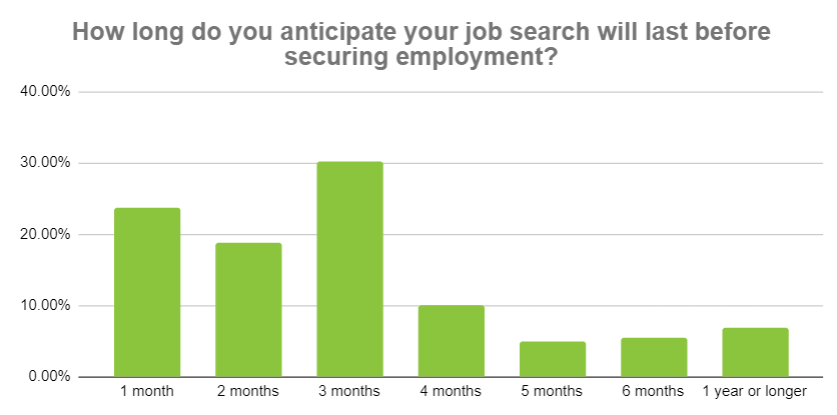
Gender differences in job search expectations
Our survey showed that males tend to be more optimistic about securing employment quickly compared to females, who generally expect their job search to take longer.
These gender differences may be tied to broader societal expectations and the persistent gender gap in career advancement.
To support female graduates, employers could focus on creating mentorship opportunities and fostering environments that promote gender equality.
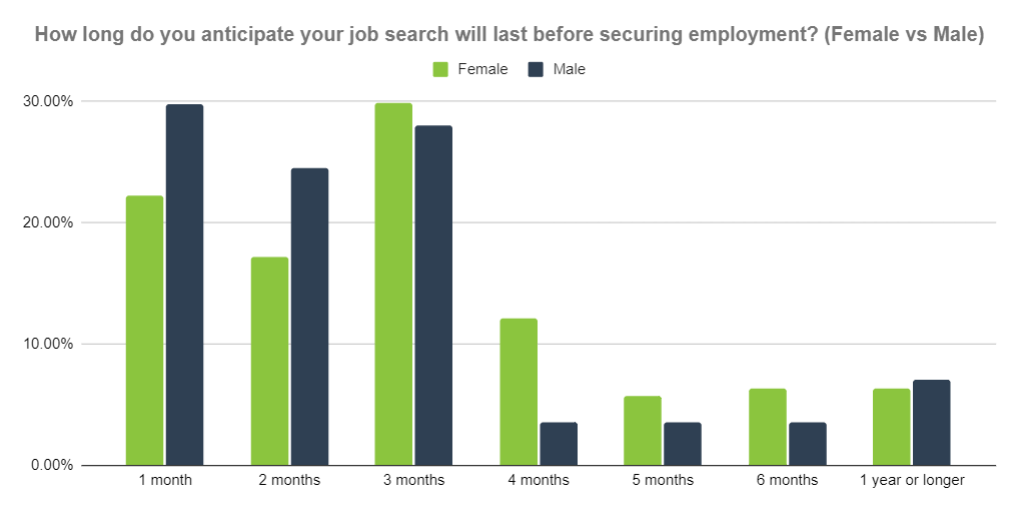
Job search and media preferences
Job search preferences
Students were asked to describe their job search preferences, revealing that nearly half (47.0%) are primarily looking for jobs within specific sectors.
Another 29.2% focus on specific job descriptions, highlighting the importance of role-specific criteria.
Geographic location is crucial for 14.2% of respondents, while 9.6% are targeting specific companies.
These preferences indicate that industry, role, and location are key factors influencing students' job search strategies.
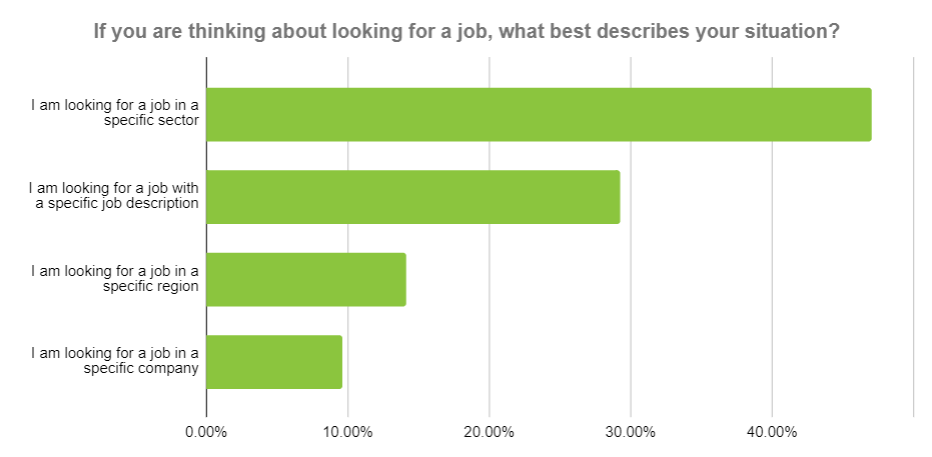
Media preferences for job search
The survey also explored media preferences for job searches, showing a strong inclination towards digital media.
While 50.2% of respondents use both print and digital media, 44.3% rely primarily or exclusively on digital platforms.
Only a small percentage (5.5%) prefer print media, either primarily or exclusively.
This shift towards digital media reflects the growing importance of online job search tools and resources.
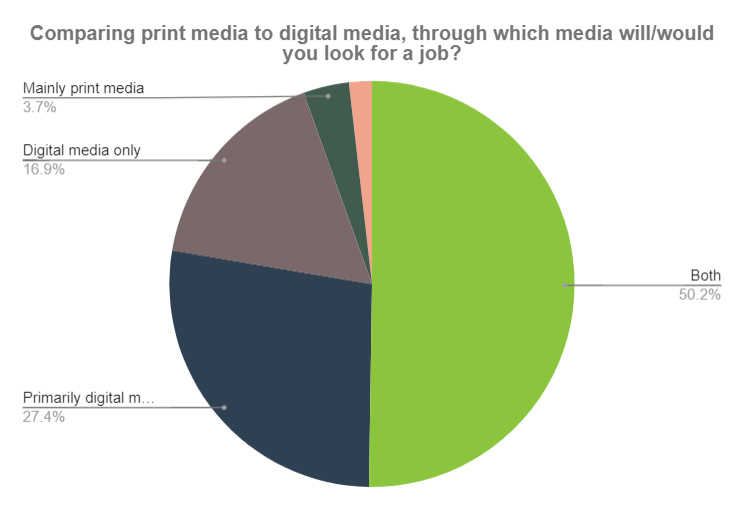
Recruitment agency websites
The analysis of recruitment agency website preferences among job seekers reveals that VDAB (13.3%), Jobat (12.1%), LinkedIn (12.1%), and Indeed (10.0%) are the most popular choices, indicating their strong role in providing job listings and career resources.
Randstad (3.8%) and student.be (1.7%) are also notable, catering to general job seekers and students, respectively. However, a portion of respondents remain undecided (19.6%) or use other platforms (22.9%), suggesting diverse preferences and potential uncertainty about effective job search resources.
The presence of "none" (3%) responses highlights that a smaller percentage of respondents do not use any recruitment agency websites.
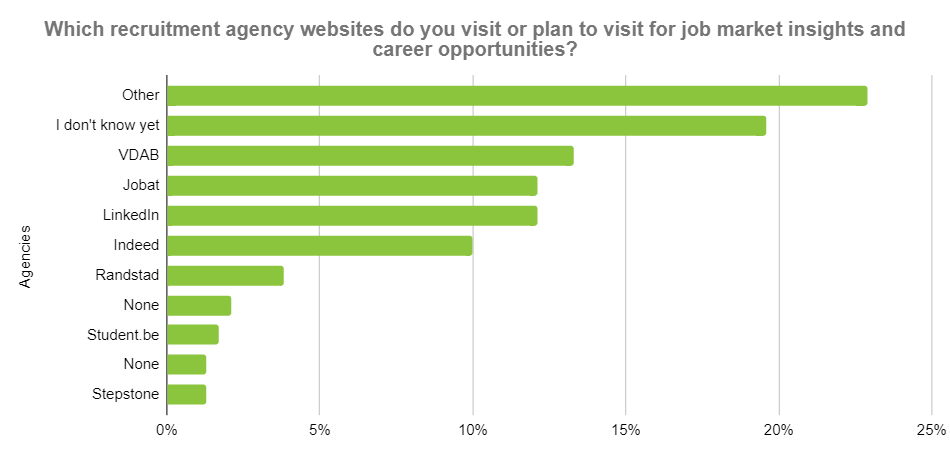
Direct channels for job information
When it comes to staying informed about the labor market, job fairs and campus recruitment are the most popular direct channels, used by 15% and 14% of respondents, respectively.
Public employment services, personal connections, and direct search methods are also commonly used.
These findings highlight the importance of both formal and informal networks in students' job search processes.
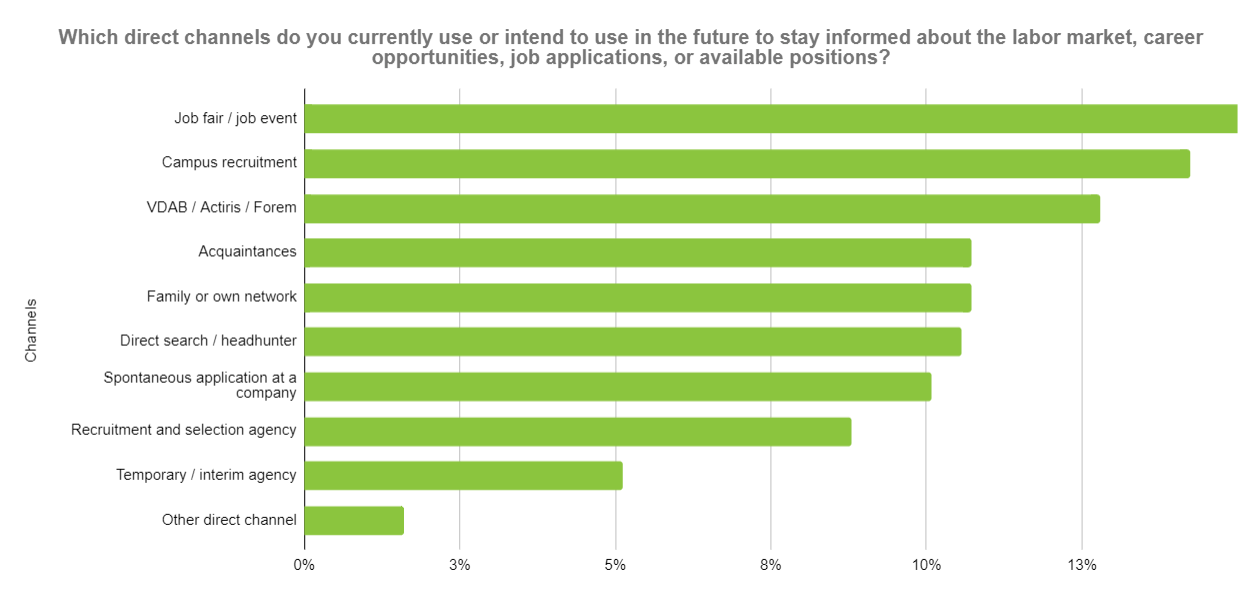
Unsolicited job offers
Interestingly, 55% of students reported being contacted unsolicited for job opportunities, with companies and recruitment agencies being the most common sources.
This proactive approach by employers and agencies indicates a dynamic job market where students are actively sought after.
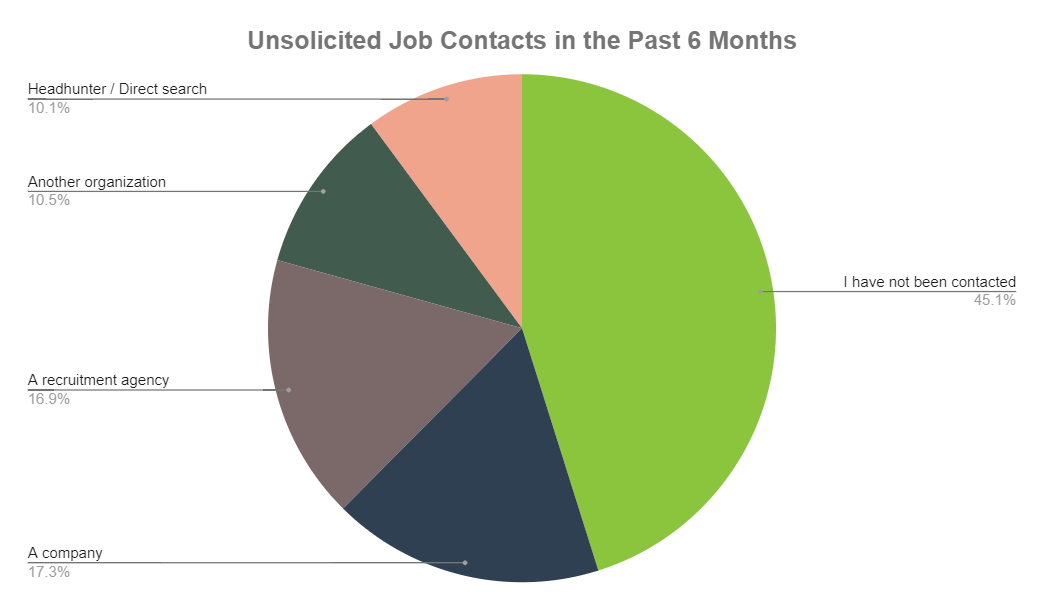
Perceptions of head-hunters
Head-hunters, specialized recruiters who focus on finding candidates for specific positions, are generally viewed positively.
Most respondents feel neutral (45.21%) or somewhat positive (32.42%) about being contacted by them.
Only a small percentage hold negative views, indicating that head-hunters are largely seen as a valuable resource in the job search process.
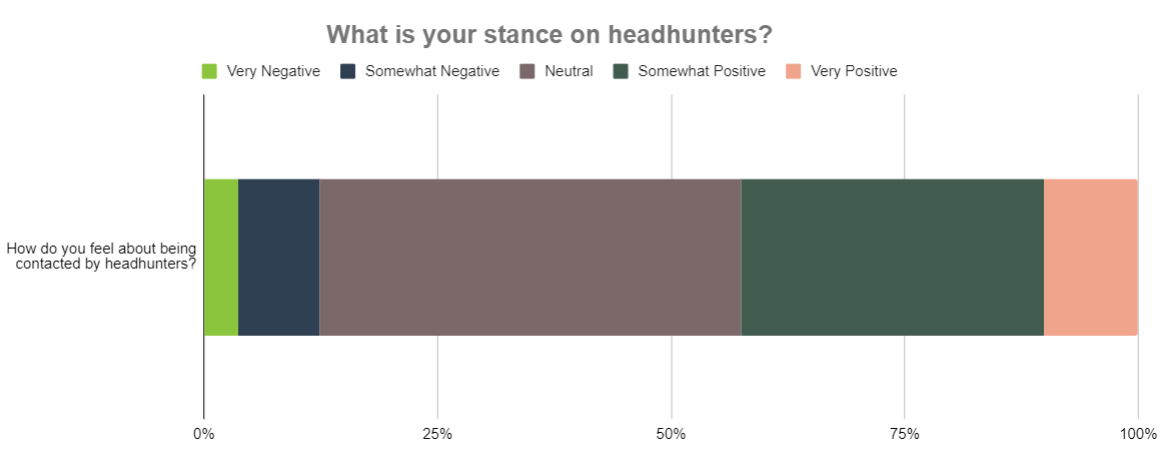
Future of recruitment platforms
When asked about the future of recruitment platforms, respondents were divided.
While 36.08% believe that traditional platforms might disappear in favour of direct company job pages via search engines and social media, 46.12% remain neutral.
A smaller percentage (17.81%) are sceptical about this shift. These mixed views reflect uncertainty about the evolving landscape of job recruitment.
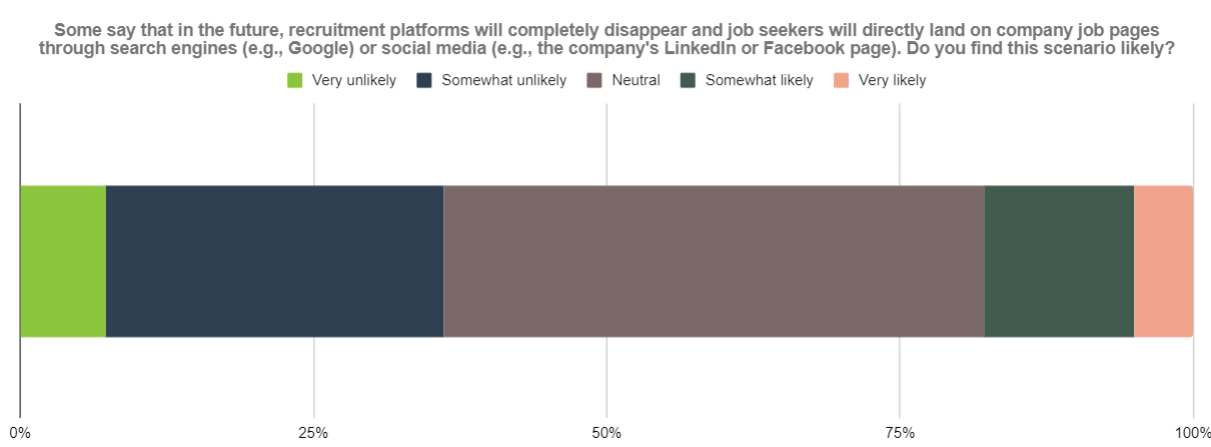
Sector preferences and company attributes
Preferred work sectors
Healthcare emerged as the most preferred work sector among respondents, followed closely by Social and Medical Services, and Education and Training.
Research-oriented fields such as R&D and Science & Scientific Research also garnered significant interest.
These preferences indicate a strong inclination towards sectors that offer opportunities for meaningful work and innovation.
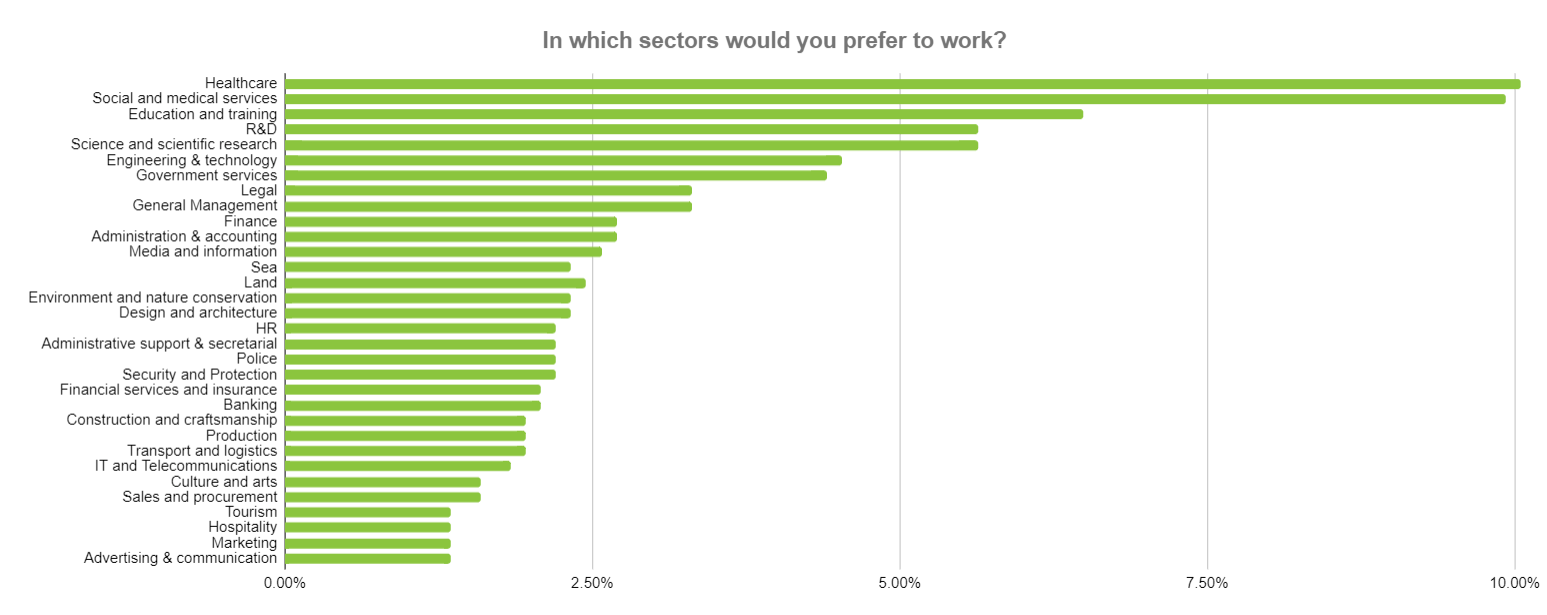
Gender differences in sector preferences
The analysis revealed notable gender differences in sector preferences, with females showing a stronger inclination toward healthcare, social services, and education, while males leaned toward engineering, R&D, and science-related sectors.
These findings mirror existing research that highlights gendered career aspirations, such as the 2020 study by UNESCO, which found that women are more likely to pursue roles in caregiving and education, while men gravitate toward STEM fields.
This trend reflects deep-rooted societal norms and gender stereotypes that influence career choices from an early age. While these preferences confirm some traditional perceptions, they also underscore the need for more targeted efforts to challenge gender bias and encourage diversity in sectors like STEM and healthcare.
By acknowledging these differences, we can better tailor educational and professional programs to foster inclusion and broaden participation across industries.
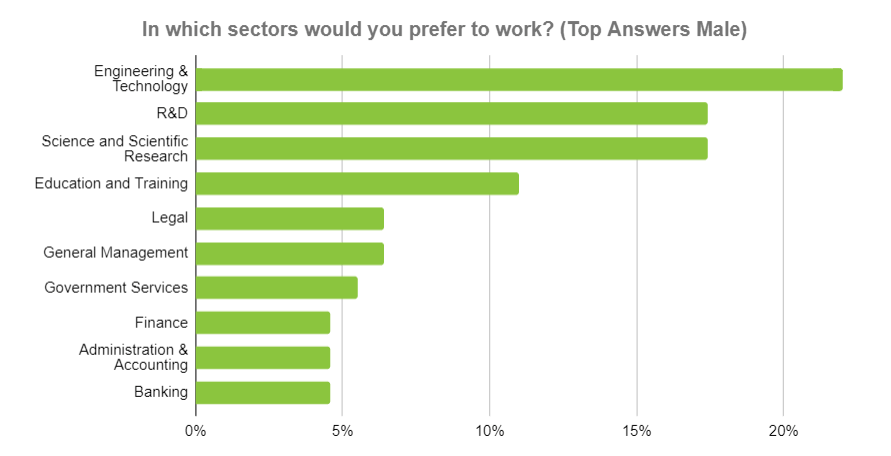
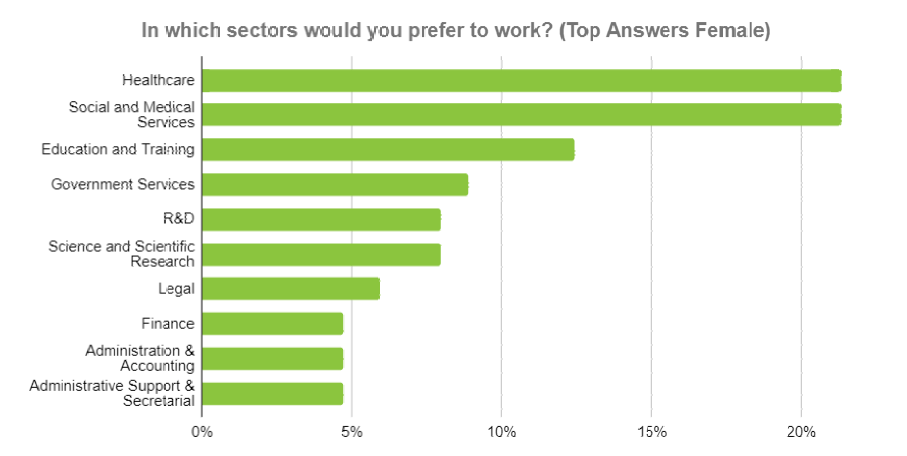
Important company attributes
The survey results indicate that certain company-related aspects are valued more highly than others when considering employment.
Work-life balance (89.04%) and career development opportunities (89.95%) are the most critical factors, with a majority of respondents rating them as important or very important.
Financial stability (70.77%), honesty and ethics (70.78%), and operating in an interesting sector (71.23%) are also key considerations.
Innovation, high-quality products/services, and strong management follow closely behind, each receiving over 60% in importance.
Aspects such as environmental friendliness, societal contribution, and a dominant sector position, while still significant, are moderately valued compared to others, suggesting a focus on personal well-being and professional growth over company prestige or environmental impact.
Overall, the data highlights a preference for companies that offer a balanced, ethically driven, and growth-oriented work environment.
Does This Challenge Gen Z Stereotypes?
It’s often said that Gen Z is primarily driven by purpose and sustainability. However, these results suggest that while purpose-driven careers are important, students still place a high value on practical benefits like financial security.
This may be surprising to some, given that sustainability often headlines discussions about what Gen Z values.
These findings suggest that while purpose is important, security and stability remain paramount, especially as young professionals enter an increasingly uncertain economic landscape.
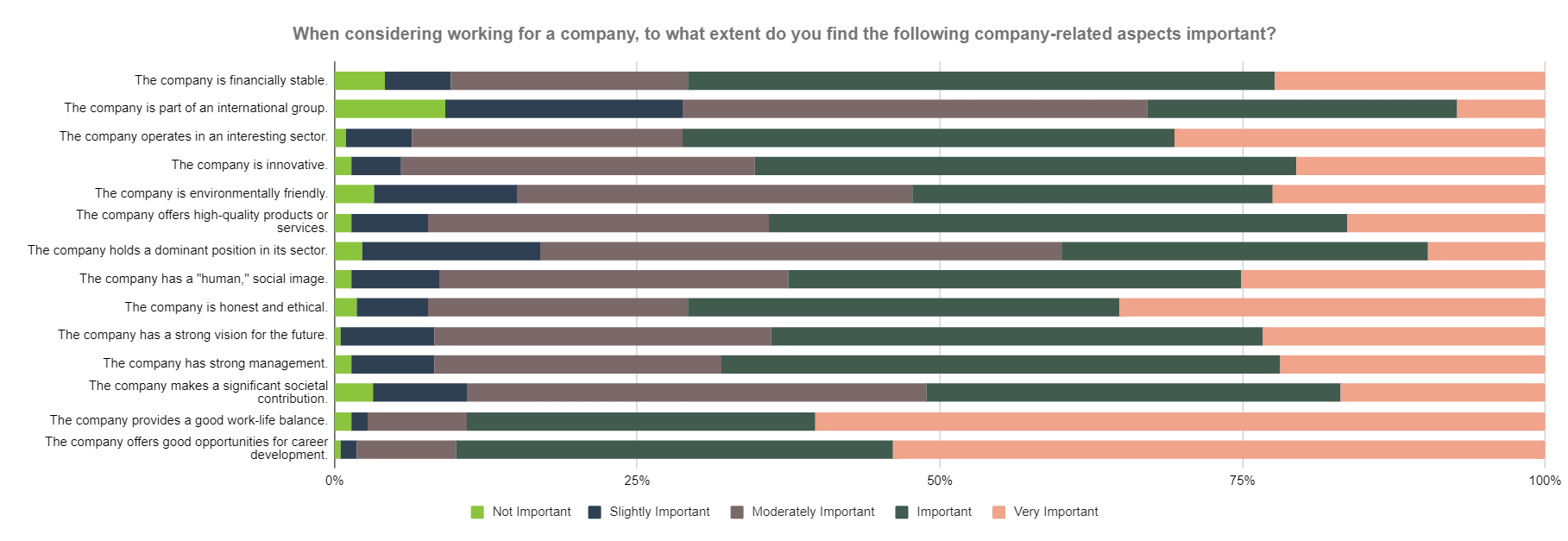
Social media presence and content
Companies on social media
A significant majority of students (60.27%) believe that companies should be present on social media as potential employers.
This reflects the growing importance of social media in job recruitment and employer branding.
Students value content related to job openings (35%), insights into the company's work environment (24%), and general company information (19.63%).
These preferences indicate that students seek transparency and a clear understanding of company culture and opportunities.
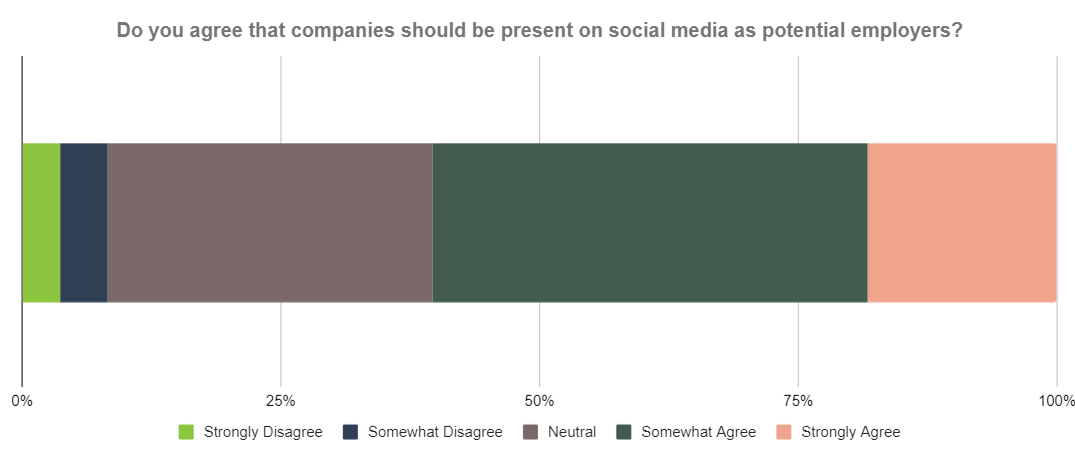
Strengths when applying for jobs
Top strengths
The survey revealed that students perceive their diploma (52.97%), ambition (41.10%), and interest in the sector (36.07%) as their top strengths when applying for jobs.
These attributes highlight the importance of formal education, personal drive, and passion for the industry in securing employment.
These findings are consistent with a report by Deloitte (2021) highlighting that Gen Z prioritizes education as a key asset but is also motivated by purpose-driven work and personal fulfilment in their careers.
Additionally, the emphasis on attributes like eagerness to learn, team spirit, and flexibility aligns with studies showing that this generation values continuous learning and adaptability, key traits for navigating today’s fast-changing job market (Pew Research, 2020).
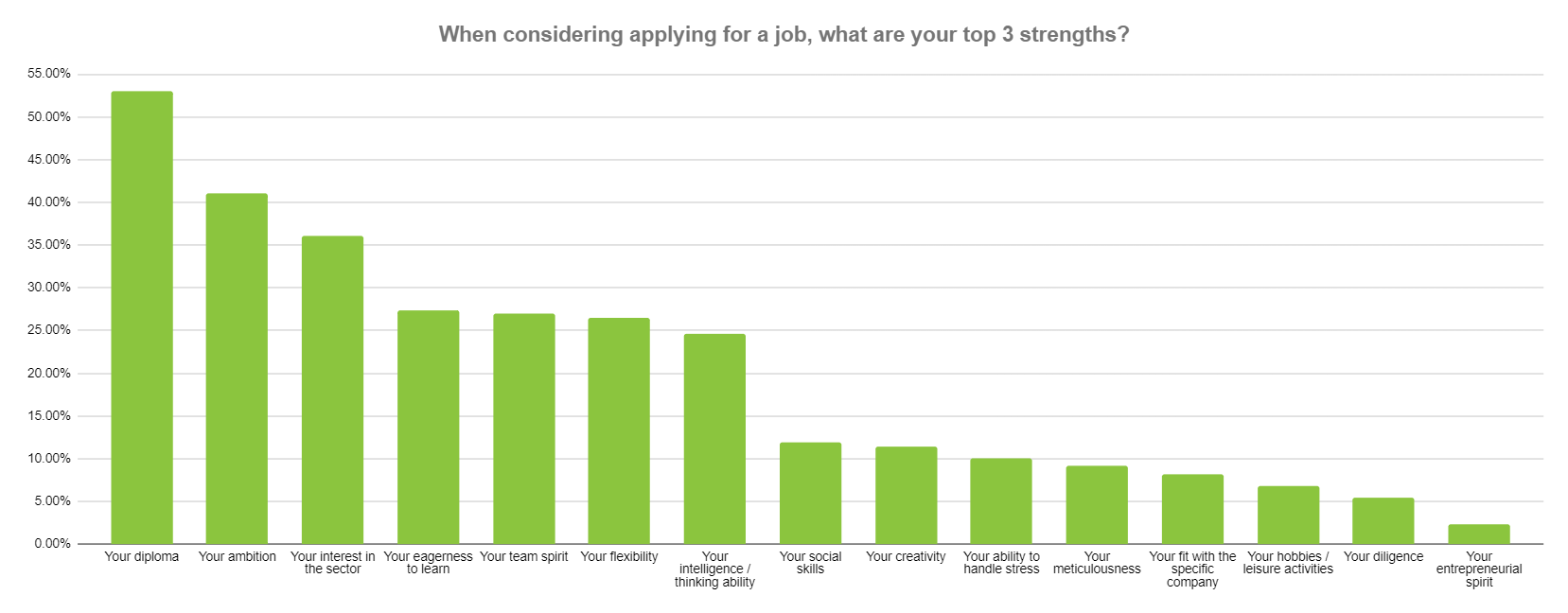
Conclusion
This survey provides valuable insights into how Belgian students perceive their professional skills, job search strategies, and employer branding.
It reveals a generation that is optimistic yet mindful of the skills needed to succeed in the evolving job market.
Employers looking to attract young talent should focus on fostering a supportive, stable work environment, emphasize their digital presence, and offer opportunities for skill development and growth.
By understanding students' career aspirations and priorities, businesses can position themselves as attractive employers, aligning their branding and recruitment efforts to meet the needs of tomorrow's workforce.

